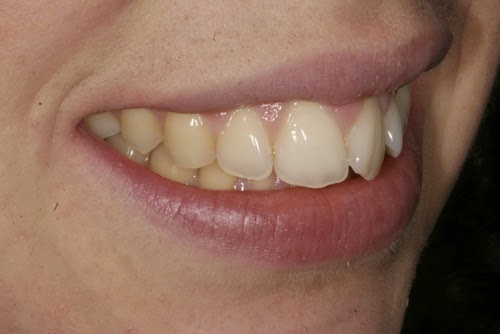Why are my teeth sensitive?
Are your teeth sensitive?
Do you avoid cold food and drinks?
How do you know if it’s just sensitivity or a more serious problem?
How common is sensitivity?
It is very common to experience some pain with extremely cold food and drinks. Teeth may also be sensitive to sweet, acidic or hot food and drinks. It is more common in young adults and women report more sensitivity than men. More often dental sensitivity is mild but for some people it can have a significant impact on their daily life.
What causes tooth sensitivity?
|
How
does dentine become exposed?
In a normal, healthy tooth dentine is covered by enamel
above the gum level and cementum on the root surface. The most common cause of
dentine exposure is gum recession leading to exposure of the root surface. The cementum layer on the root
surface is softer and thinner than dentine and is prone to wear away leaving
the dentine exposed.
What causes gum recession?
- The most common cause is gum disease caused by plaque build-up due to inadequate brushing and flossing.
- Brushing too aggressively with a wrong technique or a toothbrush that is too hard can wear down the enamel at the gum level as well as damage the gums. (For more information on brushing technique, click this link.)
- Excessive clenching and grinding of the teeth can cause enamel at the neck of the tooth to become worn away and worsen pre-existing gum disease.
- Using smokeless or chewing tobacco can lead to gum recession and more serious problems such as mouth cancer. Smoking also increases the risk of gum disease.
Dentine
can also become exposed when enamel is worn away.
This may be due to:
·
Long term tooth wear due to a heavy bite or
tooth-grinding habit.
·
Frequent exposure of tooth enamel to acidic
food and drinks.
·
Stomach acid due to reflux or frequent
vomiting.
·
Tooth decay
A cracked tooth of filling may also lead to sensitivity
or pain.
Teeth may also be temporarily sensitive after placement
of fillings or tooth whitening procedures.
How
can I tell if sensitivity is a sign of a more serious problem?
It’s not always easy to tell. It’s always best to see
your dentist if sensitivity is an issue so that they can investigate the cause
and find the correct treatment.
If you experience pain for some time after the trigger
has been removed, or if your teeth are sensitive to hot this is could be a sign
of inflammation within the tooth pulp which contains the nerve. This needs to be dealt with as soon as
possible, to avoid losing the tooth.
How can sensitivity be treated?
This really depends on the cause. The following chart
covers some of the most common causes:
Gum
disease and recession
|
Improvement
in brushing and flossing techniques.
Regular
professional cleaning.
More
complex periodontal treatment required for severe gum disease.
|
Tooth
wear and toothbrush abrasion
|
Correct
brushing technique using soft bristled brush.
Fluoride
varnish.
Fillings
or sealants may be required to replace lost tooth surface and protect exposed
dentine.
|
Tooth
grinding habit
|
Mouth
guard can be made to be worn at night to prevent tooth grinding.
|
Acid
erosion of tooth enamel
|
Change
in diet, reducing consumption of acidic and sweet food and drinks.
Treatment
of cause in case of reflux or vomiting.
Wait
20 minutes before brushing teeth after acid in mouth.
Fluoride
gel or varnish.
Fillings, crowns or veneers may be required to replace lost tooth surface and protect exposed dentine. |
Tooth
decay
|
Fillings.
Root
canal treatment may be required if decay is very deep and the nerve is
infected.
Prevention
of further decay.
|
How
can I prevent tooth sensitivity at home?
Of course, if there are certain foods and drinks which
trigger sensitivity, these are best avoided.
As mentioned above, good diet and oral hygiene will
decrease your risk of dental decay and gum disease.
Fluoride helps to reduce sensitivity and decay, it can be
found in toothpastes and mouthwashes.
Toothpastes
made specifically for sensitive teeth also contain other mineral
compounds which can help to numb the tooth nerve or create a protective barrier
preventing stimuli, such as cold and heat, from causing pain sensations. You
need to use these toothpastes regularly, twice a day. If particular teeth are
sensitive, you can use your finger to rub a small amount of paste onto the
sensitive tooth surface after brushing.
If you have any questions or concerns, please contact Smile Station (click for link),
where we will be happy to help you.

























